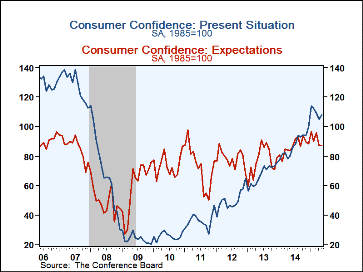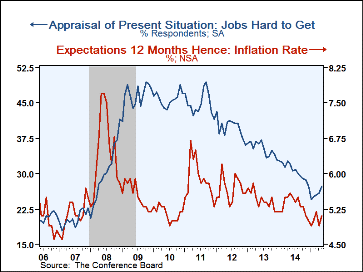 Global| May 26 2015
Global| May 26 2015U.S. Consumer Confidence Remains Sluggish
Summary
The Conference Board's Consumer Confidence Index increased 1.2% in May to 95.4 (+16.1% y/y) after falling to 94.3 during April, which was revised from 95.2. The latest figure was marginally better than forecasts of 94.5 in the Action [...]
The Conference Board's Consumer Confidence Index increased 1.2% in May to 95.4 (+16.1% y/y) after falling to 94.3 during April, which was revised from 95.2. The latest figure was marginally better than forecasts of 94.5 in the Action Economics Survey, which would have been basically flat with the original April number. Thus, after a spurt of more optimistic readings during the winter, these two recent more sluggish readings show that confidence has retreated to just slightly better than late in 2014. During the last ten years, there has been a 45% correlation between the level of confidence and the three-month change in real personal consumption expenditures.
Consumers' read of the present situation rose 2.9% to 108.1 (+34.6% y/y), reversing much of its April decline. Their expectations, though, eased again, falling 0.2% to 86.9 (+4.1% y/y).
Views on job availability were mixed. Jobs were viewed as plentiful by 20.7% of survey respondents, up from 19.0% in April and putting that share back in its post-recession high range. However, the share of people viewing jobs as hard to get also increased in May, to 27.3%, a figure closer to its higher range that had prevailed through the end of last year. And despite the positive move in the overall confidence index, the share of people seeing business conditions as "good", eased to 25.2% from 25.5%.
For six months ahead, business conditions were expected to be better by 15.6%, just barely above April's reading and down from the August high of 20.8%. At the same time, the number looking for conditions to worsen increased from April's 9.1% to 10.8% in May. More jobs were expected by 14.6% versus the high of 18.7% nine months ago. The inflation rate was expected to recover to 5.1%, after dipping to 4.9% in April. The number planning to buy a home in the next six months rose to 5.5% after two weaker readings.
By age group, confidence rose in the two younger ranges. Those under 35 registered 116.4 in May, up 1.1% from April (+9.4% y/y and those 35-54 had a reading of 103.1, up 7.2% m/m and 16.6% y/y. Older consumers, over 55, however, had a flat reading month-on-month at 80.7 (+20.4% y/y), leaving the recent level well below the first quarter average of 90.4.
The Consumer Confidence data is available in Haver's CBDB database. The total indexes appear in USECON and the market expectations are in AS1REPNA.
| Conference Board (SA, 1985=100) | May | Apr | Mar | Y/Y % | 2014 | 2013 | 2012 |
|---|---|---|---|---|---|---|---|
| Consumer Confidence Index | 95.4 | 94.3 | 101.4 | 16.1 | 86.9 | 73.2 | 67.1 |
| Present Situation | 108.1 | 105.1 | 109.5 | 34.6 | 87.3 | 67.6 | 49.8 |
| Expectations | 86.9 | 87.1 | 96.0 | 4.1 | 86.6 | 77.0 | 78.6 |
| Consumer Confidence By Age Group | |||||||
| Under 35 Years | 116.4 | 115.1 | 124.9 | 9.4 | 106.6 | 93.1 | 86.5 |
| Aged 35-54 Years | 103.1 | 96.2 | 104.8 | 16.6 | 92.4 | 76.8 | 68.5 |
| Over 55 Years | 80.7 | 80.7 | 89.7 | 20.4 | 73.8 | 61.2 | 56.7 |
Carol Stone, CBE
AuthorMore in Author Profile »Carol Stone, CBE came to Haver Analytics in 2003 following more than 35 years as a financial market economist at major Wall Street financial institutions, most especially Merrill Lynch and Nomura Securities. She had broad experience in analysis and forecasting of flow-of-funds accounts, the federal budget and Federal Reserve operations. At Nomura Securities, among other duties, she developed various indicator forecasting tools and edited a daily global publication produced in London and New York for readers in Tokyo. At Haver Analytics, Carol was a member of the Research Department, aiding database managers with research and documentation efforts, as well as posting commentary on select economic reports. In addition, she conducted Ways-of-the-World, a blog on economic issues for an Episcopal-Church-affiliated website, The Geranium Farm. During her career, Carol served as an officer of the Money Marketeers and the Downtown Economists Club. She had a PhD from NYU's Stern School of Business. She lived in Brooklyn, New York, and had a weekend home on Long Island.
More Economy in Brief
 Global| Feb 05 2026
Global| Feb 05 2026Charts of the Week: Balanced Policy, Resilient Data and AI Narratives
by:Andrew Cates









